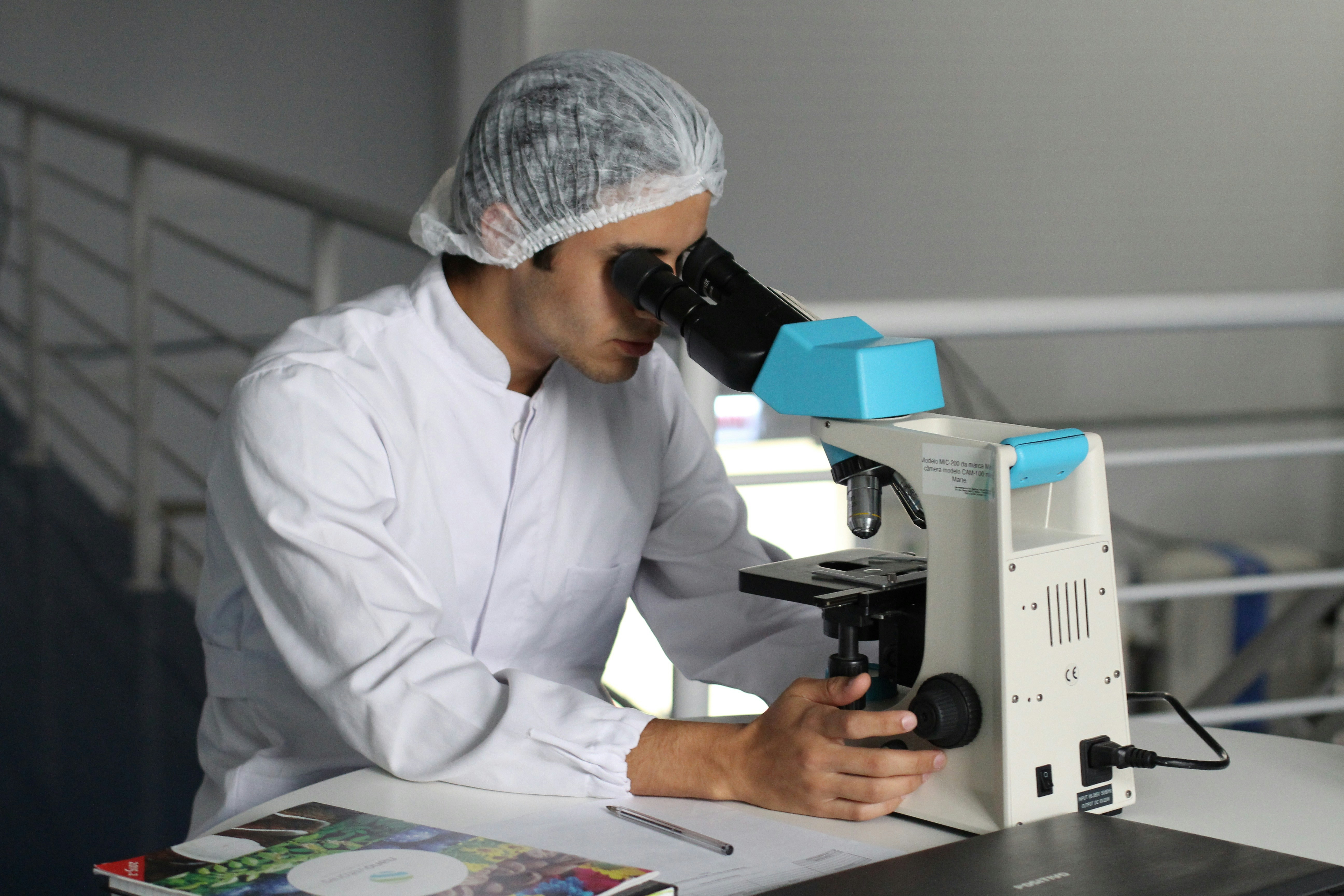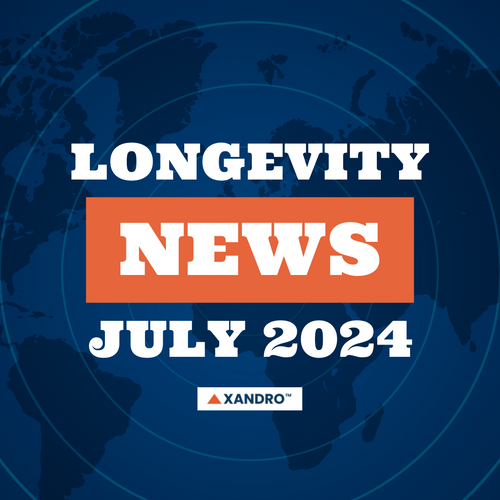Anti Aging News 2024: July Edition
29th Jul 2024
What is New in Longevity News July 2024?
The latest longevity news for July is here, with new studies about how to slow aging and even reverse aging released.
While there might not yet be a cure for aging, there are various developments in old age dying regression as well as longevity risk news to keep up to date on.
Blocking Inflammation for Longevity
Clinical trials have found that blocking an inflammation protein can extend lifespan by up to 25 per cent.
The study, conducted on mice, also found a reducing in cancer and age-related diseases, as well as a reduction in muscle degeneration and an improvement in muscle strength.
It found that blocking the IL-11 protein extended mice lifespan by 22.4 per cent in males and 25 per cent in females, and had very few side effects.
Further clinical trials are needed for humans to test anti-aging therapies.

Using Placentia-Derived-Tissues for Regenerative Therapies
In more human longevity news, BioXtek is using human placental tissues and their components to create regenerative therapies that may redefine patient care.
The company aims to help regenerate sick or injured tissues at a cell level to help create regenerative therapies that can eradicate diseases, rather than simply manage them.
BioXtek is focusing on the amniotic fluid and Wharton’s jelly and expects to see significant advancements in the regenerative medicine technology field in the next five to 10 years.
Potential New Alzheimer’s Therapy
Longeveron, a biotech company based in Miami, has announced that its lead cell therapy, Lomecel-B, has been granted Fast Track designation by the FDA for the treatment of mild Alzheimer’s disease.
Lomecel-B, derived from the bone marrow of young, healthy adult donors, is designed to target multiple aging-related processes.
Lomecel-B has also shown pro-vascular, pro-regenerative and anti-inflammatory effects and, unlike traditional Alzheimer’s treatments that target amyloid plaques or neurofibrillary tangles, Lomecel-B focuses on reducing central nervous system inflammation, a key driver of neurodegeneration.
In recent Phase 2 trials, the therapy showed promising results in slowing or preventing the progression of Alzheimer’s in some patients with mild forms of the disease.
The next phase of trials aims to take place as early as next year.
Using AI to Detect Cancer
A study made by the University of California, Los Angeles (UCLA) has revealed that an AI tool has shown remarkable accuracy in identifying prostate cancer.
This AI tool, developed by Avenda Health and known as ‘Unfold AI,’ achieved an 84 per cent accuracy rate in diagnosing prostate cancer, significantly higher than the 67 per cent accuracy rate attained by physicians.
These findings show that integrating AI into healthcare could revolutionise cancer detection, offering more reliable diagnoses and potentially improving patient outcomes.
Unfold AI also recently received approval from the U.S. Food and Drug Administration (FDA).

Eating Fruit to Ward off Depression
A recent study by the Yong Loo Lin School of Medicine at the National University of Singapore (NUS Medicine) has found that eating more fruits earlier in life may significantly reduce the risk of experiencing depressive symptoms in later years.
The study, which tracked 13,738 participants from mid-life to later life over a span of 20 years, revealed that those who ate higher quantities of fruits were less likely to suffer from depression as they aged.
The research, part of the Singapore Chinese Health Study, examined the diets of participants from 1993 to 1998 when they were around 51 years old, where participants provided detailed information about their daily consumption of 14 different fruits and 25 vegetables.
When these participants were re-evaluated between 2014 and 2016, at an average age of 73, depressive symptoms were assessed using the Geriatric Depression Scale, showing that 23.1 per cent of participants reported five or more symptoms indicative of depression.
Interestingly, the study found no significant association between vegetable consumption and reduced depressive symptoms, while fruits like oranges, tangerines, bananas, papayas, watermelons, apples and honey melons were linked to a lower likelihood of depression.
The researchers attribute this beneficial effect to the high levels of antioxidants and anti-inflammatory nutrients in fruits, such as vitamin C, carotenoids and flavonoids, which can reduce oxidative stress and inflammation — factors known to influence the development of depression.
These findings suggest that public health initiatives should promote fruit consumption among individuals in mid-adulthood, defined as ages 40 to 65 years, to enhance mental well-being in later life.
New Insights into Memory Loss
In more longevity research news, researchers at the Mayo Clinic have developed new criteria for diagnosing a memory-loss syndrome in older adults, which affects the brain's limbic system.
This condition, called Limbic-predominant Amnestic Neurodegenerative Syndrome (LANS), is often mistaken for Alzheimer's disease, however, LANS progresses more slowly and has a better prognosis.
Previously, the syndrome could only be confirmed by examining brain tissue after death, but now the criteria offer a way for doctors to diagnose it in living patients, considering factors like age, memory impairment severity, brain scans and specific brain protein deposits.
The new criteria also highlight the buildup of a protein called TDP-43 in the limbic system, which scientists have found in the brain tissue of older adults.
This protein buildup is known as limbic-predominant age-related TDP-43 encephalopathy (LATE) and might be linked to LANS, though more research is needed.

Hormone Therapy for Breast Cancer Linked to Lower Alzheimer's Risk
A new study reveals that hormone-modulating therapy (HMT) for breast cancer is linked with a 7 per cent lower risk of developing Alzheimer's disease and related dementias (ADRD) later in life.
This study, one of the largest of its kind, shows that while HMT offers overall protection against dementia, its benefits decrease with age and vary by race.
Two-thirds of breast cancer patients have hormone receptor-positive tumours, which grow in response to estrogen or progesterone, and HMT blocks these hormones, improving survival rates.
The study examined data from over 18,800 women diagnosed with breast cancer between 2007 and 2009, and of these, 66 per cent received HMT within three years of diagnosis.
After 12 years of follow-up, 24 per cent of HMT users and 28 per cent of non-users developed ADRD.
The protective effect of HMT was strongest in women aged 65–69 and decreased with age, and women over 80 using HMT had an increased risk of ADRD.
The benefits also varied by race, with Black women aged 65–74 seeing a 24 per cent reduction in ADRD risk, compared to an 11 per cent reduction for white women in the same age group.
The timing of HMT initiation is crucial and should be tailored to a patient's age, with the study highlighting the need for further research, particularly into racial disparities and the different types of HMT.
Antioxidant Supplements Slow Vision Loss in Late-Stage AMD
Daily antioxidant supplements may slow the progression of late-stage dry age-related macular degeneration (AMD), potentially helping patients preserve their central vision.
The study reviewed retinal scans from the Age-Related Eye Diseases Studies (AREDS and AREDS2) and while it was known that AREDS2 supplements slow progression from intermediate to late AMD, the study showed they also slow progression in late dry AMD.
For most, the supplements slowed the expansion of geographic atrophy towards the retina's central foveal region by 55 per cent over three years, however, for those whose atrophy reached the central vision, the supplements had little effect.
Late-stage dry AMD causes regions of the retina to lose light-sensitive cells, leading to central vision loss as these regions expand.
The original AREDS trial found that a formula of antioxidants, zinc and copper slowed AMD progression, with AREDS2 improving this formula by replacing beta-carotene with lutein and zeaxanthin.
These findings suggest that antioxidant supplements can help slow vision loss in late-stage dry AMD, and a dedicated clinical trial to confirm these findings is in the plans.

High-Intensity Exercise Boosts Brain Function in Older Adults
A study by researchers at the University of Queensland has found that high-intensity interval exercise improves brain function in older adults, with benefits lasting up to five years.
The study showed that six months of high-intensity training enhanced cognition in healthy adults aged 65 to 85.
Participants underwent a six-month exercise regimen, including high-intensity interval training, and were tested for cognitive function, biomarkers and brain scans, and even five years later, cognitive improvements persisted.
High-intensity exercise was found to lead to structural changes in the hippocampus, responsible for learning and memory, with the findings possibly leading to exercise guidelines for older adults, potentially reducing the risk of dementia.
No Longevity Benefits from Drinking Moderately
A new study has busted the common misconception that moderate alcohol consumption comes with potential health benefits, such as lower mortality risk.
The study found that previous findings were flawed and compared to drinking no alcohol, drinking alcohol moderately has no significant benefits for longevity.
The study took into consideration the age of the participants and whether they had a lifetime of abstinence or had stopped drinking just recently.
In terms of longevity, the recommendation is an alcohol-free lifestyle.
End Note
If you’re wanting to stay up to date with successful aging tips, the latest life extension anti aging research and longevity science supplements, be sure to read our previous month anti aging news today, as well as our blogs!
What is the best longevity website? Follow us on Instagram to also learn more about longevity methods and to stay informed about your health!
